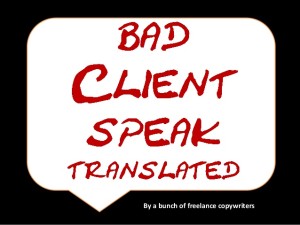
Four types of personalities that we don’t like to deal with in business. Ever. Found at Inspire CA.
Everyone deals with That Client. The one you dread working with so much that when their name pops up on your calendar you involuntarily start thinking of ways to be suddenly so ill. Yet, when you think about finally firing them, you start thinking of the finances and realise just how much you need to keep the client on your docket.
I’ve been there while bootstrapping Insanitek up — that point where you swallow your pride for the sake of your employees/subcontractors/family/bills being paid. It’s nerve-wracking, sickening, and disheartening. I’m also sure it won’t end with one client, but they will continue to pop up for the entire existence of Insanitek, and I am the lucky one that will have to deal with it.
So, what do you do?
I understand that there is a fresh wave of business owners touting that you can have perfection in life, including the sometimes magical ability to suss out only the best clients. According to them, if you start targeting the ideal client — you know that image you’ve built up of some very specific person so you know where to market — they will come in droves.
The problem with this method is that it’s great for not wasting too much of your marketing funds, but it is very unrealistic in the long run. You can’t predict based on stereotypical image in your head all the personality traits a person has. For example, we teach people how to successfully start, manage, and run their own science-based business. This is both a business incubation process and an educational process. However, I can’t define our ideal client solely on a very specific person. Instead, there are two: They geek out about science more than any other area of life and they desire to have their own company so much that they can’t stop dreaming of it.
Age? Gender? Habits? Not a freakin’ chance — we aren’t that narrow-minded.

This Slide Share has a lot of quips you’ll hear problem clients say and a fairly good representation of what they mean.
The first thing you need to do when these less-than-ideal people pop into your world is open your mind to understand why they rub you the wrong way. Is it the way they show worry over a problem? Is it the constant squirming over having to pay you on time? Is it their commandeering personality? Is it their manipulative ways? Is it the way they don’t finish the homework you assign to them?
Once you have pinpointed the exact reason behind your discomfort, you can approach it directly and appropriately. For example, I currently have a client that suddenly stopped paying on time. I sat down and had a heart to heart with them to suss out the reason — only to find out the parents of the child I work with are going through a divorce. She doesn’t have any money (though she was the more reliable one), and he is forgetful. It’s not malicious or manipulating, even though it does make things difficult on Insanitek’s cash flow from time to time.
After you’ve examined the behaviour and figured out the why, figure out a response. Instead of huffing and firing the client above, I worked on an internal bit with our bookkeeper to arrange for a more loose cash flow. We simply don’t rely on that income to come in every week, but rather every month. With the client I worked out an every-other-week payment plan, as well as gave them a couple of options to use: prepay and get a discount, once a month and get a fee. They chose to work with the every other week plan.
The key with most clients is to find a way that keeps you in control of your own business while also being flexible enough to work with them.
But what if…
By far the worst type of client to deal with is the control freak. They are the ones that give you more than a headache, but make you want to bury yourself under the covers and not come out when they show up on the schedule. Is it because they micromanage everything? Is it because they try to tell you how to do your job that they supposedly can’t do? Is it because they have incredibly unrealistic standards?
Really, it comes down to all the above. They generally think they know what your job is and how to do it, but they screw it up so badly they needed help to live up to their impossibly high standards. Then, they feel like they have to micromanage you because they have that perfectionist vision in their heads.
While it’s probably best for your sanity if you fire this client, it’s not always possible. So, minimise the time you spend on their projects and with the client all together. This is generally easier if they can’t see you work — charge by the project, not the hour, then just write down a bunch of busy notes down on your project list to make it look like you’ve done a lot of things. Psychologically, this makes the client feel like you are earning your wage. This is great for copywriters, writers, designers, etc. The client never needs to know that half that time you are working on their project you are staring at the wall trying to figure out what the hell they were prattling on about.
Now, if you are like me and do your work in the full open or with the client, you need to be strong. I have had many days where I’ve smiled, nodded, then discarded the stupidity as soon as I could. The worst is helicopter parents that bring their kids to our facilities for a “challenge”, but they don’t realise their babies either aren’t interested or aren’t even close to ready. Or, worse, they want us to slow down the lessons so the kids are held back.
When times like this come up, I redirect the client to something else. I ask them to leave, to focus on a minor task that has no bearing on the project but will keep them more than busy, to help distribute materials to the class, whatever. It always works because it gives them some purpose that they manage and get them out of your way.
The key is to redirect their nervous energy into a task that makes them feel useful and powerful — but ultimately has no bearing on your work.
The control freak client will still sap your energy, but if you can redirect them you can still keep the money flowing in while doing your work your way.







